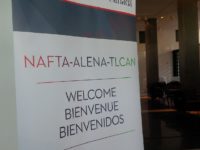It is open access week and this year I had the honour of delivering the keynote address at a terrific open access event co-sponsored by the Ryerson University Library and Archives and the University of Toronto Libraries. My talk – which can be viewed in full here or from the embed below – starts with a review of the remarkable success of open access over the past 15 years, but quickly shifts toward the continuing connection between balanced copyright and open access.

Fair Dealing by Giulia Forsythe (CC BY-NC-SA 2.0) https://flic.kr/p/dRkXwP
Copyright
Life After NAFTA: Why No Deal May Free Canada on Intellectual Property Policy
The Senate Open Caucus held a two-hour panel on NAFTA modernization last week with the intention of exploring the benefits and costs of re-working Canada’s most significant trade agreement. In light of signals that the United States be laying the groundwork to cancel the existing deal, however, the discussion quickly turned to the challenges and opportunities of life after NAFTA.
My role on the panel was to focus on NAFTA’s intellectual property and e-commerce implications. My Globe and Mail op-ed notes that to my surprise, the shift in focus to a post-NAFTA world was liberating, opening the door to considering Canadian policies that have previously been viewed as unattainable given intense U.S. pressure on intellectual property policy that favours “Americanization” of global rules. A world without NAFTA would unquestionably be a shock to the economic system, but it would also free the government to establish made-in-Canada IP policies that better reflect domestic values and pursue trade agreements that use international standards as the baseline rather than U.S. demands.
NAFTA Modernization and IP/E-commerce: My Appearance at the Senate Open Caucus
I appeared earlier this week before the Senate Open Caucus to discuss the IP and e-commerce implications of the NAFTA renegotiation. The panel, which included Jerry Dias, Al Mussel, and Brenda Swick, featured an engaging discussion with senators from across the political spectrum. My opening remarks emphasized three points from a Canadian perspective: meeting international standards, doing no harm, and seeking a level playing field. The comments are posted below.
Prioritizing the Public Interest: My Submission on Copyright Board of Canada Reform
The government’s consultation on reform to the Copyright Board of Canada recently closed with a plan for reform expected to be unveiled in the coming months. My submission to the consultation is posted below. It focuses on two areas. First, it emphasizes the overriding goal of any public institution or administrative tribunal: serving the public interest. In doing so, it points to three issues: public participation, the independence of members of the Copyright Board, and regulation and transparency of copyright collectives.
On this last issue, I note the close linkage between the parties that appear or are affected by board decisions and reform of the board itself. While the consultation document maintains that governance of collecting societies is beyond the scope of the consultation, I argue that solely addressing administrative powers wielded by the board without also assessing the rules pertaining to participation before the board will not adequately address concerns regarding the function of the board itself. In other words, the who and the how are inextricably linked and must be addressed concurrently.
Fake Data on Fakes: Digging Into Bell’s Dubious Canadian Piracy Claims
The Globe and Mail ran a masthead editorial yesterday that did not mince words with respect to Bell’s recent proposal calling on the Canadian government to support radical copyright reforms in NAFTA such as North America-wide mandatory website blocking and the full criminalization of copyright. Under the title, A Bad Idea for ‘Fixing’ Canada’s Internet Rules, the Globe argued that Bell’s plan “adds up to a frontal attack on online freedom.” Bell has earned the criticism, but it should also be noted that underlying its request were dubious claims about the state of Canadian piracy. Indeed, as Bell shifts its copyright position to mirror those promoted by the MPAA and RIAA, it seems ready to emulate age-old, discredited tactics that inaccurately seek to paint Canada as a piracy haven.


![By Office of the President of the United States (@realDonaldTrump on Twitter) [Public domain], via Wikimedia Commons https://commons.wikimedia.org/wiki/File%3ADonald_Trump_Justin_Trudeau_2017-02-13_03.jpg](https://www.michaelgeist.ca/wp-content/uploads/2017/10/Donald_Trump_Justin_Trudeau_2017-02-13_03-200x150.jpg)








